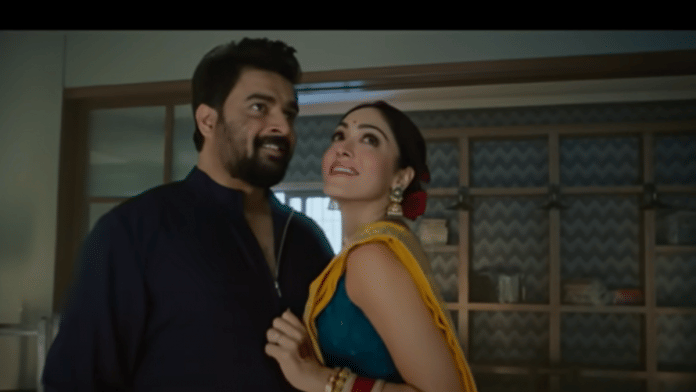The second ‘D’ in Dhokha: Round D Corner is pronounced like ‘the.’ I fail to see any logic behind this creative choice, much like the plot and existence of this film. Not to say that all entertaining films are sponsored by ‘common sense’ and advertised by ‘logic,’ but Kookie Gulati’s film is a hostage thriller where the real victim is the audience.
When you think of the cast comprising R. Madhavan and Aparshakti Khurana, even Darshan Kumar, it is fair to assume that the 122-minute-long film would be competent enough to stand on its feet. But no, you are instead served with a mind-numbing thriller that acts like an ostrich with its head buried in the ground. Towards the end of the film, two central characters break the fourth wall and smile at the camera, only to showcase how they managed to ‘cleverly’ betray the circumstances to have the last laugh. Are we supposed to play along?
The film circles around a supposedly delusional woman Sanchi (played by debutant Khushalii Kumar) who has been held hostage by an alleged terrorist Haq Gul (Aparshakti Khurana) in a Mumbai apartment. Leading a team of Mumbai Police is ACP Harishchandra (Darshan Kumar) standing helplessly, listening to Gul’s ever-changing list of demands. Sanchi’s husband Yatharth (R Madhavan), waiting alongside the army of police, warns the personnel about his wife’s “volatile” personality, a byproduct of her mental illness.
At two different times, the film attempts to exploit the trope of mental illness, perhaps, knowing well that there are no crutches left to take the narrative forward. The approach, besides being outdated, is mainly offensive.
Also read: A Netflix drama on 1984 anti-Sikh riots, Jogi is a Diljit Dosanjh film through and through
No silver lining
Talk about the character arc, and you will find that most of these characters have a shared history. While Sanchi is held hostage by her own mind, Gul, who for the most part, shares screen space with her, seems constantly confused and silly. Yatharth is a male equivalent of Bollywood’s template of a ‘housewife,’ who often disappears in the background. The only surprising part is that the disappearing background, here, is Madhavan, an actor who deserves better. Even Khurana, who has showcased his acting prowess in multiple films and web shows, is reduced to a caricature and an outdated template of a ‘terrorist,’ with a forgettable Kashmiri accent.
How do you even assess any actor when the characters themselves are so banal? In a game of two truths and a lie, the film itself has forgotten which is which.
For over two hours, I tried to—with all my might—look for any silver lining in this story, penned by Kookie Gulati and Neeraj Singh, but, sadly, the process has been exhausting, to say the least.
In a week of two film release, where one film (R. Balki’s Chup) demands you to shut up if you have nothing meaningful to say, the other film (Dhokha), should have taken the advice.
(Edited by Ratan Priya)






